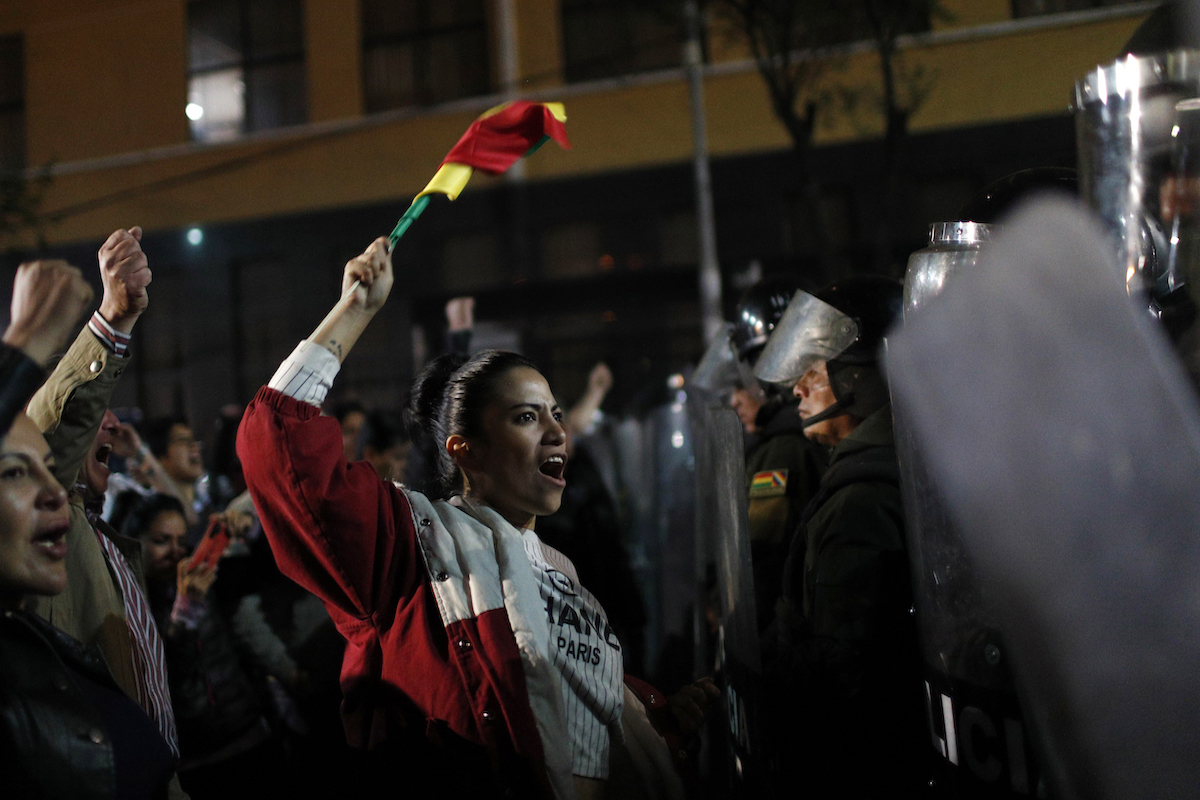

Supporters of opposition candidate Carlos Mesa outside the Supreme Electoral Court in La Paz, Bolivia, Monday, Oct. 21, 2019. (AP Photo/Juan Karita)
By PAOLA FLORES and CARLOS VALDEZ, Associated Press
LA PAZ, Bolivia (AP) — Rioting broke out in parts of Bolivia among opponents of President Evo Morales after electoral authorities announced that a resumed vote count put the leader close to avoiding a runoff in his bid for a fourth term.
Protesters set fire to regional offices of the electoral body in the southern cities of Sucre and Potosí late Monday, and a crowd burned ballots from Sunday’s election in Tarija. Bands of Morales’ supporters and opponents fought in a number of places across the country, including the capital of La Paz.
Morales’ opponents accused officials of trying to help the president avoid a runoff battle in which he could lose to a unified opposition. A U.S. State Department accused Bolivian authorities of trying to subvert the vote, and an observer mission from the Organization of American States expressed concerns about the counting process.
Tensions already were high Monday after officials abruptly stopped releasing results hours after the polls closed Sunday. The last numbers released before Monday night showed Morales topping the eight other candidates, but also falling a few percentage points short of the percentage needed to avoid the first runoff in his nearly 14 years in power.


Supporters of opposition presidential candidate Carlos Mesa burn campaign posters of ruling party congressional candidates outside the Supreme Electoral Court in La Paz, Bolivia, Monday, Oct. 21, 2019. (AP Photo/Juan Karita)
Yet, the president claimed an outright victory late Sunday, telling supporters that the votes still to be counted would be enough to give him an outright victory. “The people again imposed their will,” he said.
When the Bolivia’s top electoral authority stopped announcing new results Sunday night, Morales had 45.3% of the votes, compared to 38.2% for the closest competitor, former President Carlos Mesa. Then on Monday night, the body said that it had renewed the preliminary count and Morales led with 46.41% to Mesa’s 37.06%, with 95% of the votes counted.
Bolivian law says Morales would win an outright victory if he ended up with at least a 10-percentage point advantage over Mesa, avoiding a December second-round election. The official final count is not due for seven days.
Mesa, who stepped down as president in 2005 amid an outbreak of demonstrations led by Morales, then the leader of a coca growers union, called on citizens and civic groups “to conduct a battle in defense of the vote.”


A police officer aims pepper spray at supporters of opposition presidential candidate Carlos Mesa, who are gathered outside the Supreme Electoral Court in La Paz, Bolivia, Monday, Oct. 21, 2019. (AP Photo/Juan Karita)
“They can’t take away democracy from us,” he said at a gathering of his supporters in Santa Cruz, a stronghold of opposition to Morales.
The OAS observer mission issued a statement calling on electoral officials “to firmly defend the will of the Bolivian citizenry.”
“The OAS Mission expresses its deep concern and surprise at the drastic and hard-to-explain change in the trend of the preliminary results revealed after the closing of the polls,” it added.
Michael G. Kozak, acting assistant secretary at the U.S. State Department’s Bureau of Western Hemisphere Affairs, said on Twitter that “the U.S. rejects the Electoral Tribunal’s attempts to subvert Bolivia’s democracy by delaying the vote count.”
The U.S. rejects the Electoral Tribunal's attempts to subvert #Bolivia's democracy by delaying the vote count & taking actions that undermine the credibility of Bolivia's elections. We call on the TSE to immediately act to restore credibility in the vote counting process.
— Michael G. Kozak (@WHAAsstSecty) October 22, 2019
The foreign ministries of Argentina, Brazil and Colombia also expressed concerns about the situation.
Meanwhile, Bolivia’s interior minister, Carlos Romero, accused the opposition of trying to create turmoil and warned that “they have to take care of the violence they’re generating.”
Protests multiplied across Bolivia outside vote-counting centers after the release of vote returns resumed. In Sucre, opponents of Morales set fire to the regional headquarters of the electoral court while shouting: “Respect my vote!”
Rioting was reported in five more of Bolivia’s nine regions. In the national capital of La Paz, police used tear gas trying to quell fighting between supporters of Morales and Mesa outside a vote-counting center. Protesters threw firecrackers and stones.
“There is a heightened risk of social unrest at the moment,” Rodrigo Riaza, a research analyst for Latin America and the Caribbean at the Economist Intelligence Unit, said earlier in the day.
But he said he doubted an eruption of protests would probably unseat Morales. “International support would be weak, as there is little appetite in the region to contest Morales’ legitimacy,” Riaza said.
Morales, 59, a native Aymara from Bolivia’s highlands, became the country’ first indigenous president in 2006 and easily won the two following elections amid more than a decade of a commodities-fed economic boom in South America’s poorest country. He paved roads, sent Bolivia’s first satellite to space and curbed inflation.


Supporters of Bolivian President Evo Morales shows his support outside of the offices of the counting of votes of Supreme Electoral Court in La Paz, Bolivia, Monday, Oct. 21, 2019. (AP Photo/Juan Karita)
But he has faced growing dissatisfaction, especially over his refusal to accept the results of a 2016 referendum to keep limits on presidential terms. The country’s top court, considered by critics as friendly to the president, ruled that limits would violate Morales’ political rights as a citizen.
Being forced into a runoff would be a sharp blow to Morales, “whose political success has been impressive and who seemed confident of a first-round win,” said Michael Shifter, head of the Inter-American Dialogue, a Washington-based think tank.
***
Associated Press writer Luis Andrés Henao in Buenos Aires, Argentina, contributed to this report.


